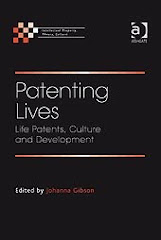 Last week has been a noteworthy one in Germany for biotechnological patents for agricultural applications and has received wide interest, nationally as well as internationally.
Last week has been a noteworthy one in Germany for biotechnological patents for agricultural applications and has received wide interest, nationally as well as internationally. Hundreds of farmers, environmentalists and others gathered outside of Munich´s Erhardtstrasse 27, the principal seat of the European Patent Office (EPO) last Wednesday to protest against the so-called „Pig patent“ EP 1651777 B1 (above; 30 pigs "accompanied" the protests). The protesters used this opportunity to file a notice of opposition backed by more than 5000 individuals and more than 50 associations against the patent at the EPO which was granted on the 16th of July 2008 to Newsham Choice Genetics.
The protesters criticized the practice of patenting biological processes since “they have nothing to do with inventions”, as Hubert Weiger, the head of the “Bund Naturschutz Bayern”, an environmental group in Bavaria, stated. The farmers were specifically concerned that the continuing patenting of life stock would seriously aggravate their work by being threatened to pay excessive royalty fees to patentees which usually are multinational corporations in this area.
Initially the patent application contained 30 claims, from which some were related to animals as such, DNA sequences and the test kit. However the examination of the EPO has limited the claims to the screening method, whereas the claims to animals (pigs), the gene sequences and the test kit were rejected. The patent now solely relates to a “breeding method whereby a genetic analysis is carried out to screen for a variation (polymorphism) occurring naturally in some pigs, with a view to identifying those animals suitable for improving pork production and to selection appropriate breeding pairs” (see the press release of the EPO).
The main motto of the protest however was: “Stoppt das Patent auf die arme Sau” which stands for “No patents on the poor pig” and hereby – deliberately or negligently - wishes to render the patent as granted to a patent on pigs as such and hence being misleading. This may be excused due to the fact that this slogan is in its German meaning quite catchy and therefore serves the purpose of the protests. The press release of the EPO however clearly highlights that no patent on animals or gene sequences has been granted. The claims as they were initially filed may have lead to the realisation of such fears as expressed by the protesters but the examiners at the EPO did their job well in applying the rules of the European Patent Convention (EPC).
However, the protests and the hereby created public interest actually do highlight a major deficiency in the IP system and its public perception. It has not been achieved to thoroughly inform society as a whole what IP, and specifically patents is all about, how it operates and where its limitations are. IP has lately had a bad press whereas its benefits are often overseen. This needs to be addressed, bearing in mind its possible negative effects as well as to further explore how these may be overcome.
The press release by the EPO has highlighted in its last paragraph another rather more legal deficiency, which remains a hot topic and warrants determined action by policy makers. The EPO ceases to have jurisdiction totally 9 months after grant and the patent then falls within the jurisdiction of the nominated Member States. Post grant “quality control” by litigation on what should be patented is therefore seriously being hampered. In case of the “pig patent” (18 of the 35 Member States of the European Patent Organisation have been nominated for patent protection) this could mean multiple - and therefore expensive - litigation in all nominated jurisdictions.
Earlier this week the German Federal Minister of Agriculture, Ilse Aigner, has proclaimed a ban on the use of the genetically modified maize strain MON 810, which has been patented by Monsanto. The Minister was not hesitant to state that the decision was not a political one but was solely based on the facts of the case. Therefore, the decision should not be regarded as a fundamental verdict on the use of genetically modified crops in Germany, as Ms. Aigner affirmed. However, the political pressure is constantly growing. The Minister of Environment of the Federal State of Bavaria, Marcus Söder, has expressed the wish to make Germany a „genecrop-free zone“ and has reaffirmed this goal in a speech at Wednesdays´ protests against the “pig patent”. He joins the Ministry of Environment of the Federal State of Hessen, which is about to launch a legislative initiative in the „Bundesrat“, the 2nd chamber of parliament in Germany which consists of representatives from the 16 federal governments, to ban the patenting of newly bred animals and plants. By doing this, the Ministry wishes to call upon the German Federal Government to lobby the European Council and the European Commission to tighten Directive 98/44/EC on the legal protection of biotechnological inventions.
It now remains to be seen what impact the incidents of last week in Germany will have on the patenting of biotechnology. Mon 810 is currently banned in 6 countries of the European Union, including Germany. And it appears that the European Commission is willing to reconsider certain issues on patenting biotechnology.



No comments:
Post a Comment